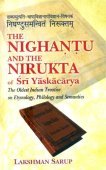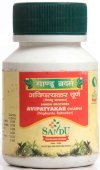Nighantu, Nighaṇṭu, Nighamtu: 18 definitions
Introduction:
Nighantu means something in Hinduism, Sanskrit, Marathi, Jainism, Prakrit, Hindi. If you want to know the exact meaning, history, etymology or English translation of this term then check out the descriptions on this page. Add your comment or reference to a book if you want to contribute to this summary article.
In Hinduism
Kosha (encyclopedic lexicons)
Source: Shodhganga: Technical study of the dictionaries published in Sanskrit language since 1800 ADNighaṇṭu (निघण्टु) is the earliest lexicon generally ascribed to Sakalya, containing a collection of Vedic words arranged in several groups. Yāska gives the derivation of the word nighaṇṭu as given by Upamanyu. The lexicon has five chapters. The first three comprise the nighaṇṭukakāṇḍa dealing synonyms, the fourth is naigamakāṇḍa dealing with homonyms and the fifth one is the daivatakāṇḍa, dealing with the names of deities. The first chapter deals with physical objects like earth, air, water and natural objects, like clouds, day, dawn, night, etc. The second chapter treats of human beings, the parts of human body, such as arms, fingers, etc., as also objects and properties associated with human beings, like wealth, prosperity, battle, etc. The third chapter deals with abstract qualities, such as heaviness, lightness, etc.
Kosha (कोश, kośa) refers to Sanskrit lexicons intended to provide additional information regarding technical terms used in religion, philosophy and the various sciences (shastra). The oldest extant thesaurus (kosha) dates to the 4th century AD.
Vyakarana (Sanskrit grammar)
Source: Wikisource: A dictionary of Sanskrit grammarNighaṇṭu (निघण्टु).—A name given to a collection of words which are mainly Vedic. In ancient times such collections were possibly very general and numerous and the works or treatises on derivation such as the Nirukta of Yaska were based upon them; cf. निघण्टवः कस्मात् । निगमा इमे भवन्ति । छन्दोभ्यः समाहृत्य समाहृत्य समाम्नातास्ते निगन्तव एव सन्तो निगमनान्निघण्टव उच्यन्ते इत्यौपमन्यवः । अपि वा आहननादेव स्युः (nighaṇṭavaḥ kasmāt | nigamā ime bhavanti | chandobhyaḥ samāhṛtya samāhṛtya samāmnātāste nigantava eva santo nigamanānnighaṇṭava ucyante ityaupamanyavaḥ | api vā āhananādeva syuḥ) | समाहता भवन्ति । यद्वा समाहृता भवन्ति (samāhatā bhavanti | yadvā samāhṛtā bhavanti) (Nir.I.1) where the word is derived from गम् (gam),or हन् (han) or हृ (hṛ). The word निघण्टु (nighaṇṭu) is taken as synonymous with निगम (nigama) by Durgacarya.

Vyakarana (व्याकरण, vyākaraṇa) refers to Sanskrit grammar and represents one of the six additional sciences (vedanga) to be studied along with the Vedas. Vyakarana concerns itself with the rules of Sanskrit grammar and linguistic analysis in order to establish the correct context of words and sentences.
Ayurveda (science of life)
Dietetics and Culinary Art (such as household cooking)
Source: Shodhganga: Dietetics and culinary art in ancient and medieval IndiaNighaṇṭu (निघण्टु) refers to a tradition of Ayurvedic literature.—Nighaṇṭu may be defined as a glossary containing synonymous groups, the names of the drugs, plants, animals, minerals or anything that is administered either as food or medicines, to the human body. Rājanighaṇṭu explains the importance of Nighaṇṭu as—“A physician without the knowledge of nighaṇṭu, a scholar without the knowledge of grammar and a soldier without weapons, all these three are laughed at in this world”. From this statement it is clear that the knowledge of nighaṇṭu is indispensable for a physician.
The early Nighaṇṭus like Aṣṭāṅganighaṇṭu, Paryāyaratnamālā, Nighaṇaṭuśeṣa, Abhidhānaratnamālā and Mādhavadravyaguṇa give only the synonyms of food items and medicines. But the later Nighaṇṭus like Dhanvantarinighaṇṭu, Madanapālanighaṇṭu, Rājanighaṇṭu, Kaiyadevanighaṇṭu and Bhāvaprakāśanighaṇṭu add the properties, reaction of the physique to them and uses of food items and medicines. [...] These Nighaṇṭus have a detailed description of almost all of the food substances as well as medicinal substances. The study of these Nighaṇṭus will make more easy to the study of Ayurvedic treatises also.
Unclassified Ayurveda definitions
Source: gurumukhi.ru: Ayurveda glossary of termsNighaṇṭu (निघण्टु):—Lexicon; Texts containing various information of medicinal substances like synonyms, pharmacological properties and actions.

Āyurveda (आयुर्वेद, ayurveda) is a branch of Indian science dealing with medicine, herbalism, taxology, anatomy, surgery, alchemy and related topics. Traditional practice of Āyurveda in ancient India dates back to at least the first millenium BC. Literature is commonly written in Sanskrit using various poetic metres.
General definition (in Hinduism)
Source: WikiPedia: HinduismNighaṇṭu is a Sanskrit term for a traditional collection of words, grouped into thematic categories, often with brief annotations. Such collections share characteristics with glossaries and thesauri, but are not true lexicons, such as the kośa of Sanskrit literature. Particular collections are also called nighaṇṭava.
Languages of India and abroad
Marathi-English dictionary
Source: DDSA: The Aryabhusan school dictionary, Marathi-Englishnighaṇṭu (निघंटु).—m A vocabulary of the words pe- culiar to the Vedas. A vocabulary gen.
Marathi is an Indo-European language having over 70 million native speakers people in (predominantly) Maharashtra India. Marathi, like many other Indo-Aryan languages, evolved from early forms of Prakrit, which itself is a subset of Sanskrit, one of the most ancient languages of the world.
Sanskrit dictionary
Source: DDSA: The practical Sanskrit-English dictionaryNighaṇṭu (निघण्टु).—
1) A vocabulary or glossary of words.
2) Particularly the glossary of Vedic words explained by Yāska, in his Nirukta.
Derivable forms: nighaṇṭuḥ (निघण्टुः).
See also (synonyms): nighaṇṭa.
Source: Cologne Digital Sanskrit Dictionaries: Shabda-Sagara Sanskrit-English DictionaryNighaṇṭu (निघण्टु).—m.
(-ṇṭuḥ) A vocabulary, a collection of words or names.
Source: Cologne Digital Sanskrit Dictionaries: Cappeller Sanskrit-English DictionaryNighaṇṭu (निघण्टु).—[masculine] vocabulary, [plural] T. of the Vedic glossary explained by Yāska.
Source: Cologne Digital Sanskrit Dictionaries: Aufrecht Catalogus Catalogorum1) Nighaṇṭu (निघण्टु) as mentioned in Aufrecht’s Catalogus Catalogorum:—See Dhanaṃjayanighantu, Dhanvatarinighaṇṭu.
2) Nighaṇṭu (निघण्टु):—a vaidic glossary belonging to the so-called Vedāṅga. Io. 1347. 1378. 1743 B. 2106. W. p. 15. 16. Oxf. 378^b. 386^a. Khn. 8. B. 1, 202. 204. Ben. 2. Haug. 30. Oudh. Xiii, 24. 28. 32 (Yv.). Burnell. 2^b. Bh. 6. Bhk. 8. Rice. 28. Peters. 2, 167. See Nirukta.
—[commentary] B. 1. 204. Np. Ii, 6.
—[commentary] Nighaṇṭunirvacana by Devarāja. Io. 1134. B. 1, 204. Ben. 1. Haug. 43. NW. 16. Np. Vi, 4. Burnell. 2^b. P. 20.
—[commentary] by Skandasvāmin. Quoted by Devarāja.
Nighaṇṭu has the following synonyms: Naighaṇṭuka.
3) Nighaṇṭu (निघण्टु):—a second name of the Hṛdayadīpaka by Vopadeva. W. p. 303.
4) Nighaṇṭu (निघण्टु):—med. Rādh. 32. [Oudh 1876-1877], 32. Sb. 289.
—by Rādhākṛṣṇa. Rādh. 32.
5) Nighaṇṭu (निघण्टु):—the well-known Vedāṅga. Cu. add. 2428. Gb. 19. Peters. 4, 2. 4. Stein 39.
—[commentary] Nighaṇṭunirvacana by Devarāja. Cs. 515. 516 (inc.). Gb. 20. 21. Rgb. 45 ([fragmentary]).
6) Nighaṇṭu (निघण्टु):—med. by Soḍhala. Rgb. 927.
7) Nighaṇṭu (निघण्टु):—vedāṅga. Ulwar 33.
—[commentary] by Devarāja. Ulwar 35.
8) Nighaṇṭu (निघण्टु):—vedāṅga. Ak 67. Bd. 72. Tb. 37. C. Nighaṇṭubhāṣya by Devarāja. Bc 446. 487.
9) Nighaṇṭu (निघण्टु):—med. Bd. 897.
—by Kayadeva (?). Bd. 898.
1) Nighaṇṭu (निघण्टु):—[=ni-ghaṇṭu] [from ni-ghaṇṭa] m. a glossary (also -ka), Name of sub voce works.
2) [v.s. ...] (mostly [plural]) Name of the Vedic glossary explained by Yāska in his Nirukta
Source: Cologne Digital Sanskrit Dictionaries: Yates Sanskrit-English DictionaryNighaṇṭu (निघण्टु):—(ṇṭuḥ) 2. m. A vocabulary.
Source: DDSA: Paia-sadda-mahannavo; a comprehensive Prakrit Hindi dictionary (S)Nighaṇṭu (निघण्टु) in the Sanskrit language is related to the Prakrit word: Ṇighaṃṭu.
[Sanskrit to German]
Sanskrit, also spelled संस्कृतम् (saṃskṛtam), is an ancient language of India commonly seen as the grandmother of the Indo-European language family (even English!). Closely allied with Prakrit and Pali, Sanskrit is more exhaustive in both grammar and terms and has the most extensive collection of literature in the world, greatly surpassing its sister-languages Greek and Latin.
Hindi dictionary
Source: DDSA: A practical Hindi-English dictionaryNighantu in Hindi refers in English to:—(nm) a classical Sanskrit name for a glossary; a Vedic lexicon..—nighantu (निघंटु) is alternatively transliterated as Nighaṃṭu.
...
Prakrit-English dictionary
Source: DDSA: Paia-sadda-mahannavo; a comprehensive Prakrit Hindi dictionaryṆighaṃṭu (णिघंटु) in the Prakrit language is related to the Sanskrit word: Nighaṇṭu.
Prakrit is an ancient language closely associated with both Pali and Sanskrit. Jain literature is often composed in this language or sub-dialects, such as the Agamas and their commentaries which are written in Ardhamagadhi and Maharashtri Prakrit. The earliest extant texts can be dated to as early as the 4th century BCE although core portions might be older.
Kannada-English dictionary
Source: Alar: Kannada-English corpusNighaṃṭu (ನಿಘಂಟು):—
1) [noun] a book in which words of a language are arranged in a particular order, with their meanings, etymologies, synonyms, etc. expressed in either the same or another language; a lexicon; a dictionary.
2) [noun] the glossary of Vedic terms compiled by Yāska.
3) [noun] that which is certain or the quality or state of being so.
Kannada is a Dravidian language (as opposed to the Indo-European language family) mainly spoken in the southwestern region of India.
See also (Relevant definitions)
Starts with: Nighantubhashya, Nighantuka, Nighantukhandanirvacana, Nighantukosha, Nighantunamavali, Nighanturaja, Nighantusamaya, Nighantusamgrahanidana, Nighantusara, Nighantusarasamgraha, Nighantushesha.
Ends with (+59): Agastyanighantu, Agastyavyakaranoktashabdasamgrahanighantu, Aindranighantu, Akaradinighantu, Ashtangahridayanighantu, Ashtanganighantu, Avyayasamgrahanighantu, Bahatanighantu, Bhavaprakashanighantu, Bijanighantu, Camundalaghunighantu, Chandonighantu, Chhandonighantu, Dashadipanighantu, Deshyanighantu, Dhanamjayanighantu, Dhanvamstarinighantu, Dhanvantarinighantu, Dravyagunadarshanighantu, Dravyavalinighantu.
Full-text (+3093): Nirukta, Nighantusara, Nighantushesha, Nighantukhandanirvacana, Nighanturaja, Nighantusamaya, Nighantukosha, Nighantubhashya, Nighantusamgrahanidana, Nighantuka, Nighamtu, Vedanighantu, Namanighantu, Nigamtu, Naighantuka, Matrikanighantu, Hanumanighantu, Deshyanighantu, Rajanighantu, Namamatrikanighantu.
Relevant text
Search found 29 books and stories containing Nighantu, Ni-ghantu, Ni-ghaṇṭu, Nighamtu, Ṇighaṃṭu, Nighaṃṭu, Nighaṇṭu, Ṇighaṇṭu; (plurals include: Nighantus, ghantus, ghaṇṭus, Nighamtus, Ṇighaṃṭus, Nighaṃṭus, Nighaṇṭus, Ṇighaṇṭus). You can also click to the full overview containing English textual excerpts. Below are direct links for the most relevant articles:
The backdrop of the Srikanthacarita and the Mankhakosa (by Dhrubajit Sarma)
Part 1 - Sanskrit koṣa texts < [Chapter V - The Maṅkhakośa]
Part 3 - Structure of the Maṅkhakośa contents < [Chapter V - The Maṅkhakośa]
Great Lexicographers of Telugu < [January 1966]
Great Lexicographers of Telugu < [January 1966]
Literary Achievements of Tallapaka Poets < [October – December, 1978]
Amarakoshodghatana of Kshirasvamin (study) (by A. Yamuna Devi)
Family system < [Chapter 3 - Social Aspects]
Flora (10): Roots < [Chapter 5 - Aspects of Nature]
Flora (3): Parts of the Plants < [Chapter 5 - Aspects of Nature]
Cosmetics, Costumes and Ornaments in Ancient India (by Remadevi. O.)
1.14. Use of Kakkola < [Chapter 1 - Cosmetics]
1.12. Use of Lodhra < [Chapter 1 - Cosmetics]
1.5. Use of Kuṅkuma (Saffron) < [Chapter 1 - Cosmetics]
Atharvaveda and Charaka Samhita (by Laxmi Maji)
Bhāvaprakāśa (Āyurveda book) < [Chapter 1 - Introduction]
Treatment of Mental illness < [Chapter 3 - Diseases and Remedial measures (described in Atharvaveda)]
Bhāvamiśra (Āyurveda scholar) < [Chapter 1 - Introduction]
Vedic influence on the Sun-worship in the Puranas (by Goswami Mitali)
Part 32 - Symbolic relevance of “Dadhikrā” in Sun-worship < [Chapter 2 - Salient Traits of the Solar Divinities in the Veda]
Part 9 - Savitṛ (the Stimulator) < [Chapter 2 - Salient Traits of the Solar Divinities in the Veda]
Part 8 - The Concept of God in the Light of the Vedas < [Chapter 1 - Vedic Concept of God and Religion]
Related products





